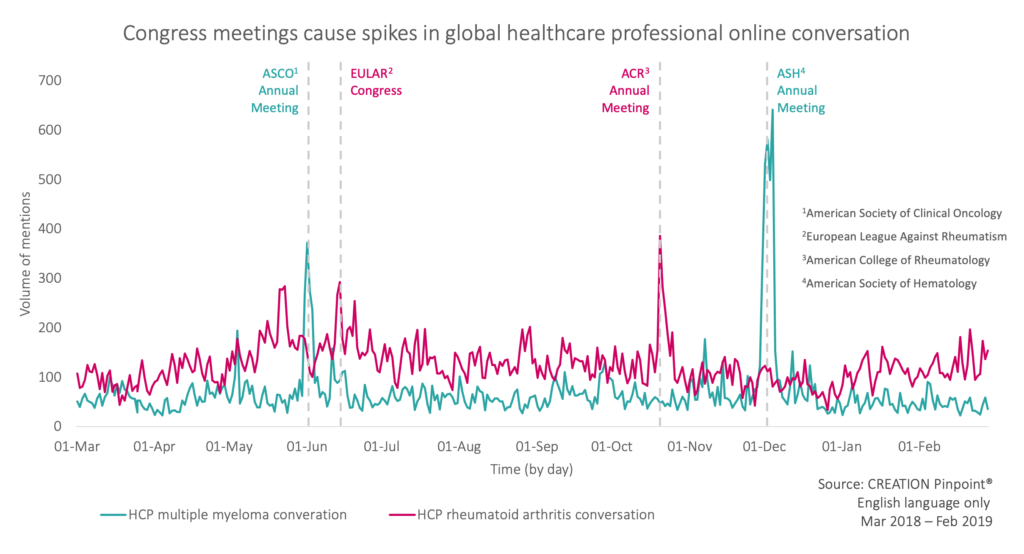This article was originally written for and published in the June 2019 edition of PMLiVE.
In doctors’ increasingly pressured professional lives, medical congress can provide a welcome space for physicians, away from front line responsibilities, to connect with colleagues, to discuss ideas, and in the words of one physician ‘to push the next line of reasoning with the latest treatments’.
Pharmaceutical brand teams have long recognised congress as an important opportunity to get face-time with customers. More recently, these same teams are beginning to consider the role that social media can play in extending the reach and impact of their traditional, onsite congress activities, and seeing social as a channel to better understand the priorities of their healthcare professional customers at congress.
As a consultancy specialising in understanding the online voice of healthcare professionals, we at CREATION have been studying the online conversation of healthcare professionals for many years. During this time, we have observed the digital behaviours of HCPs in diverse global markets, across a huge range of therapy areas – and in every scenario, we have consistently seen HCP online conversation spike during medical congress.

Why do HCPs flock to social media during congress?
Social media provides HCPs with a means of connection, both with other peers in relevant roles, and with information. Platforms like Twitter offer HCPs a highly accessible, familiar and free tool for sharing and commenting upon data as it is released, whether with the colleague sitting next to them in the lecture theatre, or (and perhaps more importantly) with peers across the globe who are following updates and taking part in conversations remotely. In this sense, social platforms can and do optimise the experience of the congress environment, enabling HCPs to follow, in real time, not only what is happening in their workstream, but what is happening across the entire congress, and to have access not only to other experts within the room, but with experts across the world.
Further to this, many online doctors are passionate about educating other HCPs regarding their specialism, and throughout the year use social media to share developments from, and develop knowledge within, their chosen therapy area (see, for example, hashtags such as #meded, #foamed and #hcsm). The plethora of data released at congress fuels this sharing of information and resources, with HCPs around the world following congress specific hashtags and ‘significant’ voices within the online conversation to keep abreast of news and discussion as it unfolds.
From the physician perspective, it is also worth considering the potential kudos of being seen as one of the first to share or sign-post to a significant finding, or a useful reflection from a speaker at congress – or indeed to profile their own research beyond the confines of the conference centre.
What does this mean for pharmaceutical marketers?
Although interest in using social channels alongside more traditional tactics has increased in recent years, we sometimes find that brand teams are reticent to take the first steps towards integrating social into their congress strategy, often citing resource or compliance issues.
In reality, when considering the role that social channels could play for your brand during congress, it can be helpful to start by considering the similarities between your online presence and your real life presence on the ground. Yes, you can be confident of seeing familiar faces at the conference centre; you can also be confident that prescribers will be gathered online to discuss the key findings shared in those sessions – and potentially the role of your product in light of those findings. Likewise, you know that HCPs participating in congress have carved out time to further their understanding, to gather resources and to build their networks, and that consequently, this is a prime time to engage your customers, who will be actively seeking out and sharing information, and looking to make new connections. The same is true in the online space.
There is little doubt that congress presents some great opportunities for pharmaceutical companies to connect with customers online. However, just as offline it can be difficult to be heard amidst the noise of the exhibition hall, online there is a danger that your ‘voice’ will be drowned out by the noise generated in response to congress. In this situation, remembering to put the basics in place can increase your chances of engaging your customers.
- Listen. Start by listening. Just as face to face conversations can give you a great insight into the views of your customers, observing the online interactions of HCPs during congress can give you an unbiased view of their hopes and concerns for new treatments, as well as highlighting what HCPs perceive to be the current ‘gaps’ in treatment. Congress can be a great time to gather competitive intelligence; how are HCP’s responding to competitor data and announcements? Taking the opportunity to listen will also give you a sense of the tone of the online conversation, and very practically, the language, lexicon and hashtags that HCPs are using to discuss and group certain topics.
- Add value. It goes without saying that adding value to customers is the cornerstone of a good customer experience. Offline, congress stands are stacked with useful educational resources, but too often, online we see pharmaceutical companies using congress as a time to ‘shout’ about their latest corporate accomplishment; in reality, these posts tend to garner little engagement from HCPs. Plan instead to offer HCPs something that will both enrich their experience of congress, and prove useful beyond the event. In the online space, this could mean anything from sharable educational resources, through to designing a Twitter poll that connects HCP peers (and perhaps patients) in a meaningful dialogue.
- Collaborate. You don’t have to go it alone; in fact, having listened to your customers, you may well find that your corporate voice is not the most effective vehicle for sharing your message. Consider the role of partners, whether Digital Opinion Leaders (those HCPs who are actively influencing the conversation within a therapy area), research organisations, advocacy groups or, where appropriate, expert patients, for collaboration around voicing a message online.
- Provide a platform for others. Could you tick both the value-add and partnership boxes by helping your Key Opinion Leaders to develop their profile using your corporate social media platforms? Increasingly, as well as planning offline symposia and speaking opportunities for KOLs during congress, pharmaceutical companies are working with their KOLs to develop corporately branded video resources ahead of congress, which can then be shared during congress in concert with KOL speaker slots.
- Broader needs. Whether on or offline, consider the broader needs of your HCPs at congress. In recent months, we have been struck by the number of posts from HCPs at medical congress that have been ‘non-clinical’ in focus, and yet have received a high level of engagement from other HCPs. This has included conversation about the need for more professional networking opportunities at congress, the provision of childcare at several high profile congresses meetings, and congress as a time for peer support and encouragement in the face of the pressures of working as a healthcare professional. Treating your customers as real people tells HCPs something about your values, and will influence how comfortable HCPs feel to interact with your brand online.
- Tracking. Tracking the online conversation pre, during and post congress can both give you an indication of how HCPs respond to new data during congress, and also how this data then goes on to influence the nature and tone of the evolving conversation beyond congress. Yes, HCPs may be excited about a particular paper or announcement, but in the weeks after congress what concerns do they have? What questions are they asking one another? Do they anticipate changing, or have they changed, their practice in response to this? Tracking the online also allows you to see the extent to which your own content has resonated, and how HCPs are responding to competitor content.
Congress serves many ends for those involved, but perhaps most excitingly, for the healthcare professionals engaged in face to face or online dialogue, it offers real opportunities to push the frontiers of medical knowledge. The challenge for pharmaceutical marketers is to engage with and add value to this dialogue – both on and offline, because by doing so, we move beyond our targets and metrics, to contributing to better outcomes for patients.


